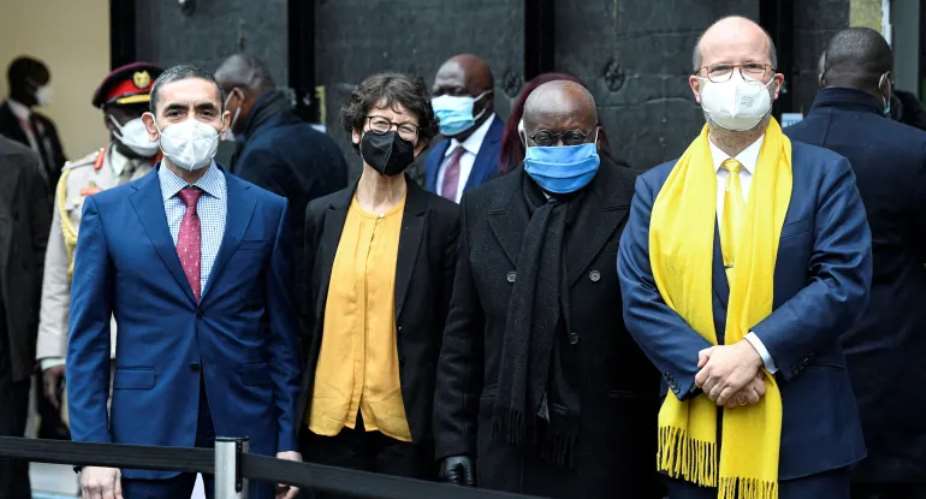The first fittingkey plant will be delivered to either Senegal or Rwanda in the second half of this year, according to BioNTech.
BioNTech CEO Ugur Sahin, his wife and company co-founder Özlem Tureci, and Ghana's President Nana Akufo-Addo.
They met in Marburg, Germany, where BioNTech on Wednesday unveiled the modular design, which consists of shipping containers equipped with the necessary equipment to produce the company's mRNA-based coronavirus vaccine.
The German vaccine maker BioNTech, which partnered with Pfizer to develop the first generally approved vaccine against COVID-19, unveiled plans on Wednesday, the 16 February, to set up production facilities in Africa that would improve the availability of much-needed drugs on the continent.
The modular concept, unveiled at a ceremony in Germany, consists of shipping containers equipped with the equipment needed to produce the company's mRNA-based vaccine, except for the "fill and finish", thus the final step of filling the doses into bottles.
"Our goal is to enable mRNA production on all continents," BioNTech CEO Ugur Sahin told The Associated Press.
BioNTech has been criticized by some campaign groups for refusing to suspend its vaccine patents and let competitors manufacture the vaccines to make them more available, especially in poor countries. The company argues that mRNA vaccines are difficult to produce and that it prefers to work with local partners to ensure consistent quality of vaccines worldwide.
"Even when working with world-class companies, it takes three to four months to ensure that they are fit as to the "know-how" for filling and processing is transferred," Sahin said. And of course, we have limited capacity to do all the technology transfer."
The first fittingkey plant will be delivered to either Senegal or Rwanda in the second half of this year, according to BioNTech. The goal is to begin producing up to 50 million doses of vaccine per year within 12 months, subject to approval by local authorities.
That's just a fraction of the 1.2 billion doses the company produced in Marburg last year. But the vaccines produced in the target country would likely be used there and in other African Union nations at a non-profit price, BioNTech CEO said.
According to BioNTech, it would initially staff and operate the facilities, but would later transfer expertise to local partners to enable independent operation. The system, which consists of 12 containers, could easily be expanded and modified in the future to produce drugs for other diseases such as malaria, cancer or tuberculosis as they become available.
CEO, Sahin said, the modular system would also allow customization of the vaccine manufacturing process. We could end up with vaccines that require a lower dose or a different formulation.
World Health Organization (WHO) Director-General Tedros Adhanom Ghebreyesus welcomed BioNTech's plan to increase vaccine production on the continent, saying it would complement the World Health Organization's efforts to promote the use of mRNA technology in South Africa and elsewhere. WHO last year took the unusual step of partnering with local companies and scientists to essentially replicate U.S. company Moderna's mRNA-based COVID-19 vaccine.
Sahin said BioNTech has no problem with other approaches.
"The more solutions that are available, the better the situation," he told the Associated Press. We want to make our innovation available to people worldwide, If others have similar goals, that's perfect.
Despite efforts to bring millions of doses of the COVID-19 vaccine to Africa through an international donor mechanism, only about 11 percent of the continent's population has received the vaccination, compared to the global average of about 50 percent.
"Given the emergence and spread of variants, the pandemic will not be over until it is over everywhere," said Michel Sidibe, the African Union's special representative for the African Medicines Agency. This initiative will hopefully expand mRNA vaccine production in Africa.
Francis Tawiah (Duisburg - Germany)





 We’ll no longer tolerate your empty, unwarranted attacks – TUC blasts Prof Adei
We’ll no longer tolerate your empty, unwarranted attacks – TUC blasts Prof Adei
 Bawumia donates GHc200,000 to support Madina fire victims
Bawumia donates GHc200,000 to support Madina fire victims
 IMF to disburse US$360million third tranche to Ghana without creditors MoU
IMF to disburse US$360million third tranche to Ghana without creditors MoU
 Truck owner share insights into train collision incident
Truck owner share insights into train collision incident
 Paramount chief of Bassare Traditional Area passes on
Paramount chief of Bassare Traditional Area passes on
 Two teachers in court over alleged illegal possession of BECE papers
Two teachers in court over alleged illegal possession of BECE papers
 Sunyani: Victim allegedly shot by traditional warriors appeals for justice
Sunyani: Victim allegedly shot by traditional warriors appeals for justice
 Mahama vows to scrap teacher licensure exams, review Free SHS policy
Mahama vows to scrap teacher licensure exams, review Free SHS policy
 Government will replace burnt Madina shops with a new three-story, 120-store fac...
Government will replace burnt Madina shops with a new three-story, 120-store fac...
